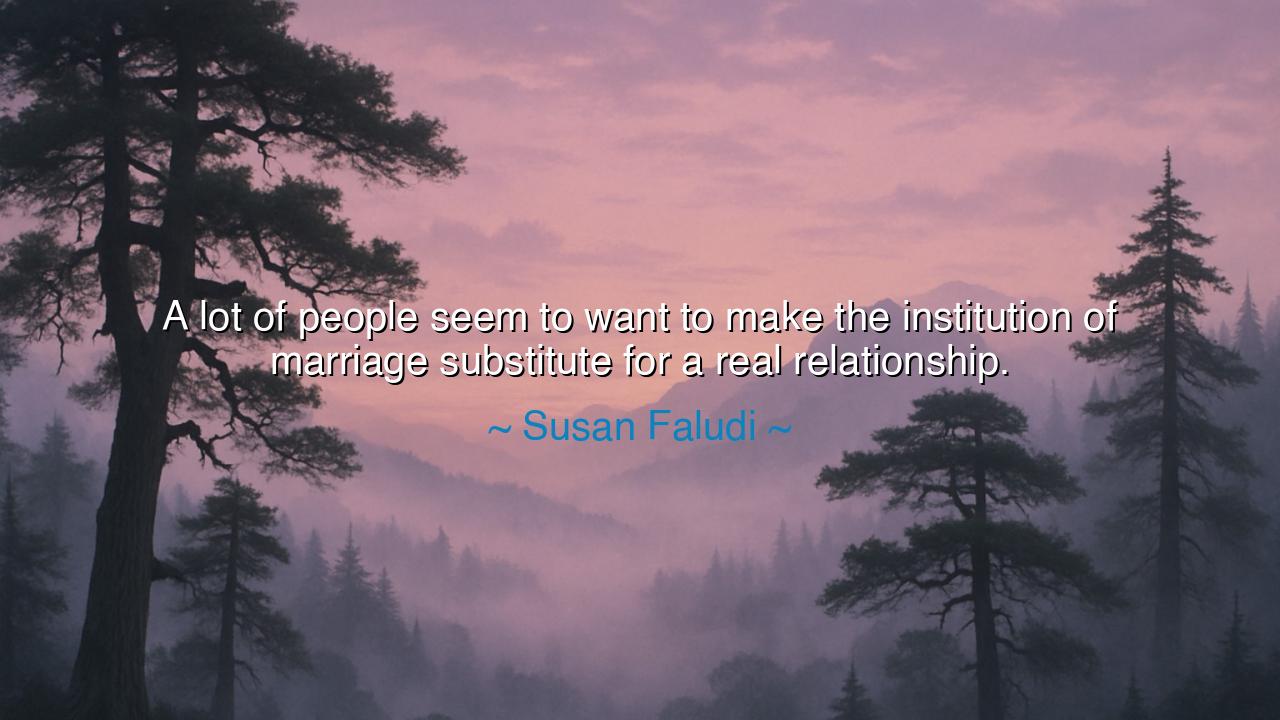
A lot of people seem to want to make the institution of marriage
A lot of people seem to want to make the institution of marriage substitute for a real relationship.






A lot of people seem to want to make the institution of marriage substitute for a real relationship—these words, spoken by the insightful Susan Faludi, stir the heart to reflect on the very nature of marriage and what it truly represents in the lives of individuals. For marriage, though an institution that has endured through the ages, is not a panacea for the deeper, more complex human longing for connection. Too often, we look to marriage as the solution to our emotional needs, as though the act of committing before others somehow transforms the inner workings of a relationship. Yet, Faludi speaks to a deeper truth: marriage, in its ceremonial form, cannot substitute for the authentic bond, the trust, the vulnerability, and the shared journey that define a real, meaningful relationship.
The institution of marriage has long been revered in many cultures, seen as the bedrock upon which families are built and societies are sustained. From the earliest days of human civilization, marriage has been understood as a covenant, not just between two individuals but between families, communities, and even nations. The ancient Romans viewed marriage as a social contract, binding people together not only in love but in mutual responsibility, both for their children and for the stability of the state. In medieval times, marriage was often seen as an agreement that transcended romantic feelings, a partnership forged for economic stability, property, and social standing. And yet, in all these instances, the true meaning of the marriage bond was far deeper than the institution itself—it was the connection between individuals that defined the strength and purpose of the union.
However, Susan Faludi brings forth a modern dilemma: the institution of marriage, for all its importance, has often become a substitute for something more profound—the creation of a true partnership. Too many, she suggests, turn to marriage as though the ceremony itself could cure deeper emotional or relational issues. In the modern world, where relationships are increasingly complex and individualistic, the marriage contract can sometimes be treated as a final goal, a destination rather than a living, breathing, evolving process. To some, marriage becomes the illusion of fulfillment, a symbol of connection, but not a true foundation for the enduring relationship that it is meant to be.
Consider the story of Henry VIII and Catherine of Aragon, whose marriage was not just a personal relationship but a political alliance that bound the fates of two great nations. The marriage, initially based on love and mutual respect, eventually became a symbol of the struggles for power, and when it failed to produce an heir, it was torn apart by Henry's desire for a new marriage. Though this institution, which had once been a promise, was broken, the deeper emotional truths—betrayal, desire, and disillusionment—were not solved by another marriage but by honest engagement with the complex realities of relationships. The institution of marriage could not cure the heart’s hunger for authenticity, love, and shared purpose.
In our modern era, we often turn to the marriage certificate as though it can seal the cracks in a relationship, patching up the inconsistencies, insecurities, or lack of true connection. The idea that a marriage can serve as a substitute for a real relationship is a dangerous myth, one that has led to many broken unions and painful heartaches. Susan Faludi warns us that the institution of marriage, however noble, cannot replace the hard work, the introspection, and the vulnerability required to build a truly intimate bond between two people. Marriage is not an end; it is a beginning, and it requires constant attention, care, and understanding. A real relationship is built through time—through patience, forgiveness, and growth—rather than a mere contract or ceremony.
The lesson of Faludi’s words is clear: marriage must not be viewed as a simple solution to our emotional or relational needs. Instead, it should be seen as a continuing process of mutual discovery, respect, and commitment. The institution itself can only flourish if the relationship between the partners is cultivated with love, authenticity, and care. We must be wary of the temptation to look to marriage as a fix-all or an ideal that we can achieve without truly working on the bond that underlies it.
So, let this wisdom guide us in our own lives: let us not seek marriage as a substitute for real connection, but rather as a reflection of the depth of our relationship. In every partnership, whether or not it leads to marriage, let us prioritize the building of an authentic bond, one grounded in trust, vulnerability, and mutual respect. Marriage may be an important step, but it is the quality of the relationship that will determine its strength and enduring power. Let us strive for relationships that are full of depth, understanding, and mutual care, so that, in the end, the institution of marriage becomes not a symbol of perfection, but a celebration of the love and connection we have worked so hard to create.






AAdministratorAdministrator
Welcome, honored guests. Please leave a comment, we will respond soon